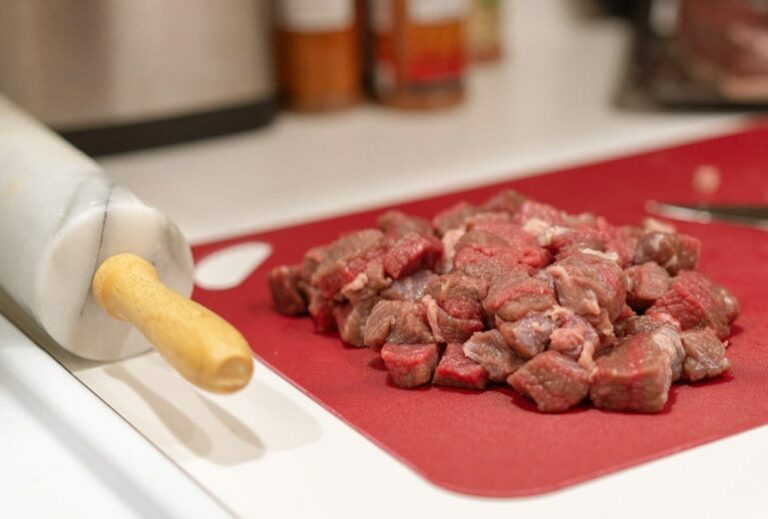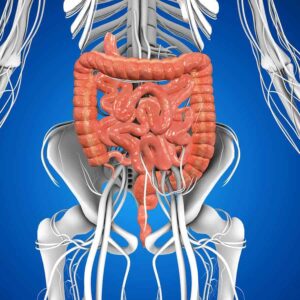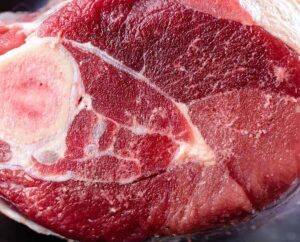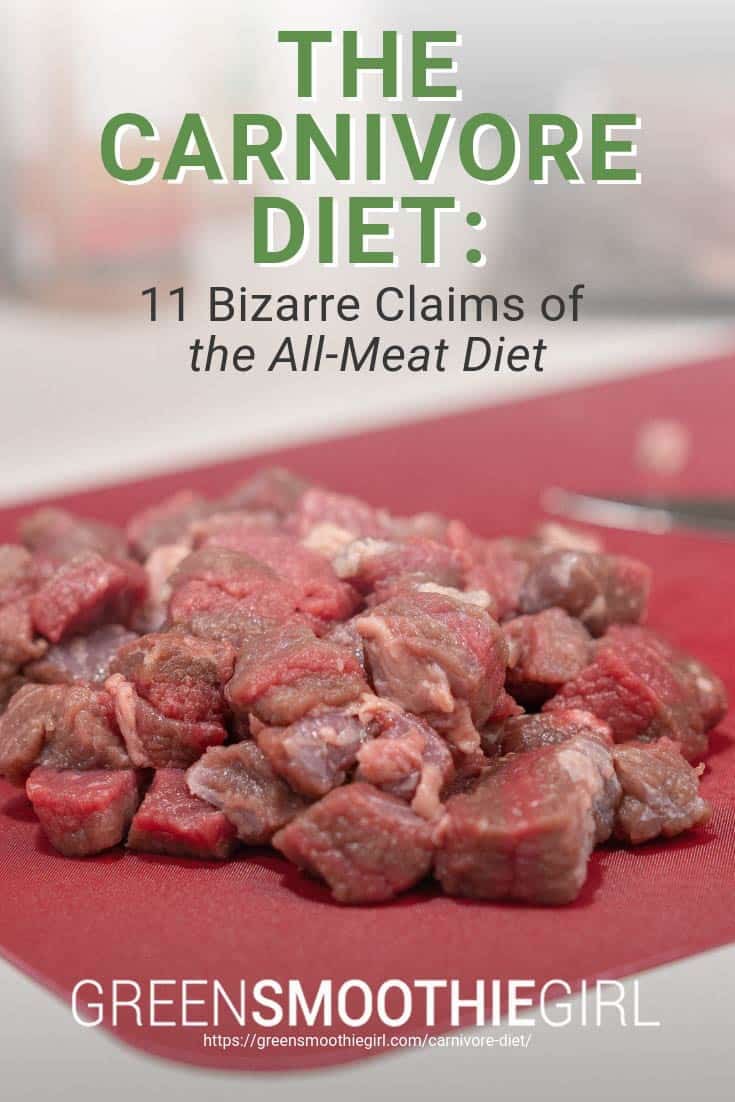The Carnivore Diet: 11 Bizarre Claims of the All-Meat Diet

Just when I thought the worst of the fad diets had come to light and been exposed for their dark secrets and fraudulent claims, another surfaces: The Carnivore Diet.
And I thought the Ketogenic Diet was bad.
In this post:
- What Is The Carnivore Diet?
- Researching The Carnivore Diet
- Who Is Promoting The Carnivore Diet?
- 11 Claims of the Carnivore Diet
- The Boulder Carnivore Conference
- Final Thoughts On the Carnivore Diet
What Is The Carnivore Diet?
Here is the ridiculous premise of this diet: “Plants have poisons in them to keep their insect and bird predators at bay, so they’re toxic to human beings.”
This is what is called, in your Logic 101 class in college, a non sequitur. That is, using a premise to prove an unrelated point. (Just because a plant compound is toxic to a cricket, does that make it poisonous to a human?)
In addition, like those that follow the Paleo fad diet, carnivores believe that grains came with the advent of agriculture and, therefore, our bodies are not designed or have not adapted, in the past few hundred years, to digest plant foods.
This leaves meat, salt, and water for sustenance--the basis of the Carnivore Diet.
Researching The Carnivore Diet
With thousands of published studies out there that prove the benefits of a plant-based diet, I’ve been curious how the promoters of this diet argue their case. I’ve also been concerned to see longtime dieters jump on the Carnivore bandwagon. I’m worried about their long-term health.
So, I banned myself from all the podcasts I normally listen to, and I binged on every podcast I could find that interviews the “experts” who are making a medical case for all meat, and no plants, being a good diet for anyone.
This blog post is the deep dive into their arguments, what the evidence actually tells us about these arguments, and whether this is a useful diet for weight loss or any other purpose.
Let’s consider a diet that has its origin in the Mediterranean basin, an area known as “the cradle of society.” The plant-based Mediterranean Diet has a legitimate lock on every disease-preventative and longevity claim in the modern age. And the body of evidence that whole plant foods prevent cancer, cardiovascular disease, and autoimmune disease is now thousands of studies strong. Check out our reference section at the end of this post; even though it barely touches the surface of the scientific data supporting a plant-based diet, it will give you a good start.

There is ample scientific evidence that a plant based diet can help you live a long, healthy life.
And now, let’s talk about those references. Please take the time to compare the resources in this blog post to the references in studies, blogs, and podcasts regarding the Carnivore Diet. You’ll notice that those who are marketing (yes, marketing) this diet are making inferences from the studies they cite. They do this because they cannot prove their points with any qualitative, long-range study showing positive outcomes for people who don’t eat plants.
Unfortunately, you’ll have more than enough chances to embrace or deny their claims and read their references, as marketers of this diet are just beginning to mount their steeds and begin their assault against diets that promote a healthy, balanced way of life that the body of evidence supports.
Some of my references at the end of this blog are compendiums of the published literature. That is, my first nine references cite hundreds or even thousands of studies showing a plant-based diet to be (a) disease preventative, (b) most likely to lead to longevity, and (c) better for the environment.
I would also like to point out that while a few of the people championing the all-meat diet in these interviews are MDs, medical doctors have the same amount of nutrition education that the average person on the street does. (That is, they do not have any.)
So, while medical doctors should be our experts on pharmaceuticals, surgeries, and technology interventions within their specialty, I’m not sure that a medical degree particularly qualifies someone to argue to throw out the body of evidence and try a fad diet void of fiber and nutrients instead.
That said, the vast majority of MDs agree with nutritional experts saying that this diet is a travesty against human health.
Who Is Promoting The Carnivore Diet?
Let’s take a look at a few who are espousing the benefits of the Carnivore Diet.
Dr. Paul Saladino, MD
Paul Saladino, MD, responds to the frequent complaint that antibody levels, such as IGF-1, are high in all-meat eaters, and that glucose readings go crazy when people cut plants out of their diet. He states that their glucose readings aren’t really high; they’re moderate—and that high antibodies are just a temporary shift, nothing to worry about it.
I may feel a little relief if I didn’t know that Insulin Like Growth Factor-1 (IGF-1) is associated with several different types of cancer.
Dr. Kevin Stock, DDS
Dr. Kevin Stock, a dentist and national level physique competitor, states that he is exclusively “carnivore,” and invites you into his 30-day quick start program. If you opt in, he sells you his products. His Level 1 allows you to keep eating dairy products, and drinking coffee, tea, and stimulants, but you just have to give up all plants, which he claims are “dangerous.” In his Level 2, you eat nothing but beef and water.

If you're competing in a body building competition, eating a lot of meat might make sense to you because it helps build muscle mass quickly.
Did you notice that Dr. Kevin Stock is a national level physique competitor? When I waded through the Carnivore Cast (a podcast dedicated to helping people succeed eating only animals), many blog posts online, and other podcasters’ interviews with doctors promoting the all-meat diet, I found that many of the names of their online personas, books, and courses, are things like “War on Carbs,” "Mark Smelly Bell," “Getting Jacked and Tan,” “Meatheads,” and other evidence that the valid arguments for eating all meat is to put on muscle mass fast, mostly for competing and recreational bodybuilders.
The Carnivore Diet And Bodybuilding
I will happily cede this point that carnivore diet promoters have long bragged about: animal flesh (and processed products such as whey protein in a plastic bucket or mylar bag), will put on muscle mass faster.
I don’t think anyone would dispute this. The price to be paid for this behavior, though, is steep, in long-term disease risk. It should also be noted that the admittedly lower quantity of muscle amassed eating plant proteins, for the rest of us, is far more durable muscle.
Common Carnivore Diet Side Effects
Another thing to point out is that most of these podcasts and blogs admit to many health challenges along the way, including fatigue, hair loss, thyroid problems, digestive problems, body odor and bad breath.
Astonishingly, on podcasts like ZeroCarb Journal, Carnivore Cast, Modern Carnivore, The Carnivore, Meathead, and others, the advice given to these problems isn’t to reconsider the diet, but rather, to take some pills, and gut it out.
Dr. Anthony Gustin runs a podcast about eating mostly or all meat, and he says he’s losing his hair and his skin looks “frail.” This young man admits that he feels a bit better, getting “off Keto” and going “Carnivore,” but….he’s “still bald” (his words).
I’m certainly not alone in my bewilderment about how educated people could really think that this diet is healthy.
Even in the United Kingdom, the land of meat and potatoes, the National Health Services (NHS) recommends that people limit their intake of red and processed meat to about 1 pound a week in order to reduce their risk of colon cancer.10 Compare this to the Carnivore Diet folks who are eating as much as 3 to 4 pounds a day!
Jordan Peterson and Mikhaila Peterson
When Adam Gabbatt, a writer for The Guardian, went on the Carnivore Diet, he spoke with Mikhaila Peterson, the 26-year-old daughter of Jordan Peterson (the famous Canadian psychologist), who introduced it to her father after experimenting with her own diet.
All-Meat Diet: Diarrhea, Constipation, and Fatigue
Mikhaila warned Adam that she had diarrhea the first six weeks of the diet. Adam did, in fact, experience diarrhea which was followed by severe constipation as well as extreme fatigue. He described the Carnivore Diet as “truly, punishingly awful.” (11)

Anecdotal evidence suggests that a meat only diet can wreak havoc with your digestive system, causing diarrhea and constipation.
I could go on and on with examples of people who have suffered following the Carnivore Diet marketers’ advice, but instead of inundating you with the numerous studies and scientific facts that oppose the basis of this diet, let’s take a look at the arguments of those advocating for the Carnivore Diet. I will dissect their statements point-by-point and explain the proof counter to it as well.
You’ll see their basic arguments in the subtitles, with my response to their claims below these headings.
11 Claims of the Carnivore Diet
1. Plant eaters just have good genetics.
The argument: All the longest-living people on the planet eat plants, but it’s really their genetics at play. They could eat anything; they just have great genes.
“It was actually due to genetics that these people would be healthy in spite of what they eat. No matter what they eat, these people will be healthy.”
--Paul Saladino, MD, on Ben Greenfield’s Fitness Podcast
Response: This was a very pat answer by Dr. Paul Saladino, a functional medicine practitioner, but the evidence suggests otherwise.
Let’s take a look at Okinawa, islands that have the highest number of people living to the age of 100 and beyond. Younger people in Okinawa who adopted a western diet that includes more meat, more fast food, fewer vegetables, and less fish, have the same diabetes, obesity, and other disease rates that the U.S. does, despite the fact that their grandparents ate a whole-foods, plant-based diet.12 In fact, a growing number of studies conducted on immigrants conclude that the longer they live in the United States, the worse their rates of heart disease, high blood pressure, diabetes, and inflammatory bowel disease due to adopting an American lifestyle.12a, 12b
Genes And Disease
In addition, Dr. Saladino seems to have missed the memo that the burgeoning field of epigenetics has documented that 5 percent or less of diseases are caused by genetics. And that food and other lifestyle choices cause genes to express, or not.13
Now, let’s take a deeper look at Dr. Saladino’s background, which included studying with physicians from the Center for Integrative Medicine. These physicians include Dr. Andrew Weil, a pioneer in the field of integrative medicine, who promotes an Anti-Inflammatory Diet that excludes meat and is rich in complex carbohydrates such as vegetables and fruit, healthy fats, beans, and a little fish. We have to wonder how or why Dr. Saladino has veered so far from his functional medicine training based on scientific evidence.
2. Plant remnants in feces are proof you can’t digest plants.
The argument: "If you poop and have remnants of seeds, nuts, and veggies, that’s a sign that your diet is wrong, and you aren’t digesting your food."
--Paul Saladino, MD, on Ben Greenfield’s Fitness Podcast
Response: No, it’s a sign that indigestible plant fiber is doing its work, dragging and cleaning out the digestive tract appropriately.
You don't need to read the literature for 25 years--as I have since I reversed my own 21 diseases (that have remained in remission) with a 95%+ plant-based diet--to know what happens to your digestive tract and the rest of your body when you stop eating fiber. You feel hungry, experience constipation, raise your cholesterol levels, and tire easily.

Some plant fiber helps "clean" out your intestines as it is not digested completely.
You already know what happens when you start eating more fibrous foods. More throughput is a positive thing.
You feel lighter, more energetic, and have clearer thinking. I believe that the Carnivore Diet, to the extent that it’s “working” for anyone, is a reaction to the meteoric rise in gut disease, where some Americans are currently reactive to healthy foods like grains, legumes, nuts and seeds, or nightshade vegetables. But we’ve put the cart before the horse.
The problem is the gut and liver disease in so many, not the healthy plant foods that have been the primary sustenance for billions of human beings and hominids for 3 million years.
3. There’s no benefit to fiber; in fact, it’s probably constipative.
The argument: “We’ve really been fed a fairytale with regard to fiber and constipation, fiber and diverticulosis. Fiber probably causes constipation. And in terms of adenomas or precancerous lesions and colon cancer recurrence, there’s no benefit.”
--Paul Saladino, MD, on Ben Greenfield’s Fitness Podcast
Response: The evidence is clear that this isn’t true. Soluble fiber (which mops up toxins, including waste cholesterol and harmful carcinogens) and insoluble fiber (which acts like a broom and sweeps clean your digestive tract) are critically important.
By eating more fiber, you set yourself up for a healthy cardiovascular system and decrease your risk for diabetes and certain cancers, such as colorectal cancer, which is becoming an epidemic in younger populations that are eating a high-meat, high-processed-food diet.
Saladino also claims that people who eat the most fiber have the most diverticulosis. He seems to be confusing thousands of studies showing benefits of high-fiber plants in the diet, with a handful of studies using Metamucil or other fake “fiber” products, showing that taking Metamucil doesn’t prevent colon cancer.
Metamucil is a synthetic chemical, and while it may cause a bowel movement, it also causes inflammation and is in no way similar to eating a whole-foods, plant-based diet.14
If you are looking to cherry-pick data, you can certainly find a lack of efficacy in studies that gave Metamucil to subjects otherwise eating the Standard American Diet (S.A.D), but you cannot make a legitimate case that “fiber is a fairytale” or that it doesn’t have a beneficial effect in the gut.
Prebiotic Fiber In The Gut
Prebiotic fiber is the food for microbes in the gut. The synergistic effects of the whole food, including soluble and insoluble fiber, is incontrovertible. You have a GI tract that, when stretched out, reaches across the room you’re in, about twice and back.

The microbes in your gut that digest your food need food themselves to do their jobs properly. Probiotics are responsible for this job!
(Take a look at that space in the room you’re in. Really picture it, because this is important to understanding what kind of food is necessary for a person with 35 feet of GI tract all compressed in a matter of inches, into your abdomen.)
Because of this, you must eat enough roughage (from plants) to assist decaying animal protein from putrefying in the gut, polluting your blood, and heavily taxing your liver and gallbladder.
You aren’t built like a cat (or any other carnivore), with a short gut that goes straight from mouth to anus and needs little or no fiber to move food through.
Dr. Paul Mason, a Specialist Registrar in the Australasian College of Sports and Exercise Medicine, took the stage on March 7th at the first Boulder Carnivore Conference, showing data on how fiber is problematic and contributes to autoimmune disease.
I’m not sure if these “researchers” are confusing the Metamucil studies with the evidence on eating a whole-foods, plant-based diet on purpose or out of ignorance.
But there is no connection between stirring a pharmaceutical product into water and chugging it, while sticking to your Standard American Diet, and eating the nutritious foods our ancestors ate for millennia.
At this same conference, recently put on by Amber O’Heard, the lunch menu was bacon, beef ribs, eggs cooked in lard (because all plant oils are banned on the Carnivore Diet), and rotisserie pork. That’s all. I feel my arteries clogging up just thinking about it.
These “experts,” looking to find favor at pro-carnivore rallies, have become adroit at extreme reductionism, honing in on one phytochemical and its effect on insect predators, or one factor in the complex human system, while ignoring the big picture—much like how medicine (now virtually controlled by pharmaceutical companies) focuses on abating one symptom, without any attention to how it affects the organism overall.
Fiber And Colon Cancer
Dr. Saladino suggests that there is no protective link between fiber and colon cancer. According to the American Institute for Cancer Research, “Plant foods rich in dietary fiber help protect us against colorectal cancer as well as other chronic diseases.”15 That is, of course, just one of the many organizations that devote their time and attention to disease prevention and treatment that hold the same belief after reviewing the massive body of evidence.
4. Meat-only diets cure inflammatory and autoimmune disease.
The argument: I went on the carnivore diet and lost 15 pounds and put my rheumatoid arthritis into remission.
--Mikhaila Peterson (BioHackers Podcast / Joe Rogan’s Podcast)
Response: Mikhaila Peterson is the young adult daughter of author Jordan Peterson. She was suffering from widespread inflammation, pain, and many crippling autoimmune diseases. She has been on many of the Carnivore Diet stages, saying that she reversed her arthritis and other conditions and is doing better eating meat only.

If you go on a carnivore diet and you have an autoimmune disease that seems to magically disappear, is the meat really the culprit?
Jordan Peterson, who suffers from some of the same diseases his daughter does, has also recently, at least temporarily, converted to an all-meat diet and seems to be using his influence to promote this as a healthy way to eat.
Popular podcaster Joe Rogan interviewed Mikhaila Peterson recently and pointed out the same thing that I would. That is, eliminating whatever in her previous diet was causing the inflammation (dairy, gluten, and food-additive chemicals are likely culprits) would be a likely cause of why she is doing better.
On stage at the recent Carnivore Conference in Boulder, Peterson told a story about how she went to a restaurant and asked the staff to scrub the grill, and avoid putting any spices at all on her beef, due to her extreme sensitivity. She ate the meat they cooked for her, and her arthritis flared and her pain and inflammation returned. Her assessment was that they must not have followed her instructions and didn’t scrub the grill well enough, or somehow put some seasonings on her steak.
This, according to her own story, is not a young woman in remission from RA. This reaction is not evidence of a strong immune system, or a state of health, and it is certainly not evidence that eating only meat is her complete answer.
While I believe her when she says that she felt better going from her previous diet (and we don’t know what that was) to an all-meat diet, the difference can likely be explained in the elimination of her triggers.
Misinterpreting Inflammatory Triggers
When healthy foods are triggers, which is becoming an epidemic, the functional medicine consensus is that there is a significant gut/liver problem that needs to be resolved. Removing the offending foods whose compounds cause inflammation will reduce symptoms, but a metaphor may be useful: y`ou can’t just put duct tape over the warning light in your car’s dashboard. You have to address the bright red engine light.
If the all-meat diet is a therapeutic diet to allow her gut to heal, to be able to return to what science has repeatedly shown is a balanced and healthy diet, for life—then, great. I hope that Mikhaila Peterson is in the care of a good functional medicine doc looking into the root cause.
But there is zero evidence to show that eating all meat will serve Peterson well, for life. (She’s also at high risk for parasites, as there are 1,000 larvae in the average square inch of beef. Some experienced functional medicine doctors have said they’ve never seen a case of cancer where there weren’t parasite overgrowths involved.)
I have found only people who have been on the diet for a few months, making the claims of disease reversal. If you have fewer antibodies in the body for a time, having removed offending foods, that’s wonderful.
But if we think about the long term rather than just the short term, removing all fiber and most of the micronutrients from your diet puts you at massive risk for colorectal and breast cancers, gut disease, and, unfortunately, it also puts you at high risk for advancing and compounding autoimmune disease. (When you do not treat the root cause of the AI disease, cascading additional AI diagnoses are usually what comes next.)
5. Plants are toxic and cause disease.
The argument: “Plant molecules...do other toxic things in our bodies. Curcumin and piperine are maybe not as good an example as sulforaphane. The sulforaphane in broccoli seeds can cause thyroid disease. It’s actually not incredibly difficult to make yourself hypothyroid by eating broccoli sprouts.”
--Paul Saladino, MD, on Ben Greenfield’s Fitness Podcast
Response: Sulforaphane is one of the most celebrated nutrients in the entire plant kingdom, and is part (but not all) of the reason that the crucifer family is so powerfully anti-cancer, as dozens of studies show.

Broccoli sprouts contain a source of myrosinase enzyme and sulforaphane as anticancer treatment.
Sulforaphane is actually one of the most frequently studied plant-derived organosulfur compounds. A comprehensive compendium of studies found these wide range of biological effects: antioxidant, antimicrobial, anticancer, anti-inflammatory, anti-aging, neuroprotective, and antidiabetic.16
The Flawed Case Against Anti-Nutrients
Dr. Saladino may be confused, thinking that goitrogens in crucifers are why cabbage, broccoli, cauliflower, etc. contain an anti-nutrient that some say interferes with thyroid function. Anti-nutrients are substances found in plants that either reduce the availability or adversely affect a plant’s nutrients.
Research indicates that low levels of anti-nutrients may actually be beneficial and play a part in the prevention of chronic diseases such as cancer, cardiovascular diseases, and diabetes, to name a few. Unless you’re going to binge on broccoli, it would be very difficult to eat enough veggies to produce a toxic effect due to anti-nutrients.17 I’ve written before about the research that shows that anti-nutrients are not at all toxic to humans.
There are also dozens of other compounds in these plant foods that are well-documented to be protective for the thyroid. While I agree that broccoli seeds have concentrations of nutrients such as sulforaphane, I cannot find any scientific evidence to support Saladino’s claim that eating these seeds can cause a thyroid condition.
In fact, a recent study published in Biomedicine & Pharmacotherapy found that the levels of thyroid hormones remained unchanged after ingesting broccoli sprouts. The sprouts were actually found to have a protective effect against sulfadimethoxine induced thyroid damage. In animals with hypothyroidism, broccoli sprouts were found to exert a beneficial influence.18
Plant foods do, in fact, contain anti-nutrients. This fact is the entire premise of the Carnivore Diet, scaring people about eating any and all plants.
But these promoters miss the burgeoning evidence that the same foods that contain salicylates, oxalates, goitrogens, phytates, lectins, and more—also have dozens of other protective compounds.
And, in fact, as Dr. John Douillard explained in my podcast interview with him, many researchers theorize that anti-nutrients have a positive role in human metabolism and health, much like they are discovering that small amounts of bacteria, yeasts, and even parasites thought to be “bad” have a hormetic (mild, positive stress, stimulating immune function) role in our health.
6. Humans evolved to eat primarily--probably only--meat.
The argument: When humans broke off from primates, they became hunters and gatherers. Therefore, humans in 2019 should eat all meat and no plants.
--Mikhaila Peterson (Joe Rogan’s Podcast)
Response: In fact, when humans broke off from primates, and evolved, they retained the extremely long 30- to 35-foot-long gastrointestinal tract. We also have never developed the sharp canines that are designed to rip and tear apart flesh. Humans are not built like any carnivore, and that’s because we have never been carnivores.
Carnivorous Eating With A Human GI Tract
While you can make a case for our ability to be an omnivore, the human digestive tract looks like those of herbivores all over the world. And it looks like no carnivorous animal anywhere. While the human body is astonishingly adaptable to a variety of diets, the GI tract has not gotten shorter, such as in the case of cats, who have a straight GI tract going from mouth to anus. Rather, we have at least 30 feet of GI tract, packed into a small space in our abdomen.

The fact that the human GI tract is more similar to that of herbivores in the animal kingdom, suggests that humans are meant to eat plants more than meats.
Followers of the Paleo diet argue in favor of even heavier meat eating than the Standard American Diet, because that’s what Paleolithic man ate. The diet has fallen from favor in most circles due to clear evidence from anthropologists that, in fact, the many colonies of Paleolithic man ate mostly plants, and if they ate meat, it was seasonally, and once a day at most, when they could obtain it.
[Related: 22 Experts Debunk Ketogenic, Paleo, & Low-Carb Diets]
Ben Greenfield, a health and fitness expert, who underwent a “modified” carnivore diet (which included root vegetables, berries, seeds, nuts, and other foods), recently addressed the theory that our ancestral populations were exclusively carnivorous. He cited several groups that, while consuming meat, also partook in an assortment of vegetables. Here are examples of just a few:
- The nomads of Mongolia included tubers, roots, seeds, berries, wild onions and garlic in their diet.
- The Canadian Inuit dined on berries, lichens, and sea vegetables which accompanied their whale, walrus, and other meats.
- The Sioux of South Dakota ate wild fruit, nuts, and seeds as well as buffalo.
7. You can get all your nutrients from eating animals--you just have to do it right.
The argument: You don’t actually have to get micronutrients from plant foods, as long as you eat the whole animal, nose to tail, including organ meat, connective tissue, tendons, bones, face, and brain. You don’t need need flavonoids—in fact, they may be harmful. If you eat nose-to-tail, you’ll get plenty of Vitamin C.
--Paul Saladino, MD, on Ben Greenfield’s Fitness Podcast
Response: I’m pretty sure that Nobel-prize winner Linus Pauling is rolling over in his grave. Saladino believes that we can get all the Vitamin C we need from an animal’s liver and, if you’re an Inuit, from whale blubber. The simple solution? Just eat an animal nose-to-tail! We may need to add a harpoon to our hunting supplies.
Vitamin C degrades in heat, so you will have to eat your liver raw. Even then, it is not a rich source of this important nutrient that, when deficient, has been linked to scurvy, dry and damaged skin, painful and swollen joints, weak bones, and a poorly functioning immune system. In addition, raw liver is a significant infection source of toxocariasis, a parasitic roundworm. What other pathogens may be lurking in that raw liver? E.coli, salmonella, and other bacteria, viruses, and parasites.
Eating “Nose To Tail” Impractical For Micronutrients
Saladino claims that all the micronutrients you need are found in animal products, despite evidence to the contrary. Mostly he relies on the argument that you don’t actually need some of the classes of micronutrients that the scientific literature says are disease-preventative for humans. While wild game may be a healthier option, very few people have access, and even fewer people have the stomach to eat the connective tissue, organs, intestines, anus, skin, face, bones, and other parts of the animal which, according to some in the all-meat movement, is vital in order to obtain all the nutrients you need from meat alone. (Others in the Carnivore Diet movement just eat steaks and chicken and eggs and the like, and ignore all of that.)
Human Physiology and Meat Eating
While I agree that connective tissue and organs may be nutrient-dense (ancient man ate animal products in their raw state, and carnivorous animals still do), we do not have the pointed canines to tear raw flesh, nor the serrated molars that tear instead of grind, nor the very acidic stomach pH which can kill the pathogens found in raw meat.
In our modern world of toxic chemicals, animal flesh has up to 10 times more glyphosate and other herbicides, pesticides, insecticides, and fungicides, than plant foods--even when those plants are grown conventionally (sprayed), and not washed. That’s because herbicides and the other -ides concentrate in animal flesh.

Animal flesh traps toxic chemicals which then get transferred to your body when you eat it.
Most of those in the carnivorous movement are eating 100% cooked, dead flesh, which no other animal species or human population has ever done.
Humans do not have the endogenous enzyme manufacturing ability to fully digest cooked animal products. People who eat meat must rely on high-fiber plant foods to help move the meat through the colon.
[Related: How Digestive Enzymes Work--And Why You’re Probably Deficient]
8. Plants are a last-resort food.
The argument: Plants are inferior foods that you should eat only when you can’t get meat.
--Paul Saladino, MD, on Ben Greenfield’s Fitness Podcast
Response: In fact, plants take 5 percent of the Earth’s resources versus the same weight in animal products. 2,500 gallons of water are needed to produce 1 pound of beef.²
Livestock or livestock feed occupies ⅓ of the earth’s ice-free land. Animal agriculture is the leading cause of species extinction, ocean dead zones, water pollution, and habitat destruction. You get the idea.
Now consider the fact that some of the proponents of the diet talk about eating 3-4 pounds of beef every day.
This means that a person on the Carnivore Diet consumes 20 times more of the Earth’s resources than those of us eating a whole-foods, plant-based diet. I did not find any of the Carnivore Diet’s proponents addressing this issue, so I add it here.
To be honest, the above heading is so ludicrous, I almost hate to waste my time debating it. Study after study after study shows that it is far better to get your protein, as well as all the other nutrients, from plants. Think about it: What sounds better for you? Beans or bacon? Pound-for-pound, plants pack way more nutrients into far fewer calories and offer the added benefit of fiber. Oh, I forgot: according to present-day carnivores, we don’t need fiber.
Meta-analyses show that people who eat plants versus animals tend to live longer, healthier lives.19
Oxford-Cornell Project Findings
In fact, one of the most comprehensive studies ever conducted on human nutrition proved the importance of a plant-based diet. The Oxford-Cornell Project yielded over 800 statistically significant findings, from studying 6,500 people in China, half of whom natively ate 20 percent animal protein (like the average American does) and half of whom ate 5 percent animal protein (like all of the Blue Zones do—the longest-living people on the planet).5
Those with high-protein diets had astronomical rates of cancer and other disease similar to Americans (who also now natively eat 20 percent animal protein), and those eating very little animal products had extraordinarily low rates of cancer, heart disease, and autoimmune disease.

Many studies have linked eating mostly fruits and veggies can help reduce your risk of getting cancer.
This research by Oxford and Cornell is the type of data that highlights long-term outcomes. (Over the course of a lifetime, what happens? Consider that versus, “What do my lab results say, three weeks or three months after ditching my Standard American Diet and eating all meat?”)
The massive human study was conducted after very similar results were discovered in rodent populations fed the same percentages of protein. While every carnivorous marketer or anyone with a vested interest in the meat and dairy industries has criticized or dismissed the collaborative research by Oxford and Cornell led by T. Colin Campbell, PhD, the fact remains that researchers all over the world repeated Campbell’s animal studies with consistent results.
9. Studies that show plant foods to be nutritious were done incorrectly.
The argument: “Nutritional research is a terrible form of science and we should really look at anecdotes.”
--Scott Myslinski (Carnivore Cast Podcast)
This quote from Scott Myslinski, the host of the podcast Carnivore Cast, summarizes Dr. Shawn Baker’s assertion that “the plural of anecdote is data.” Dr. Baker is a non-practicing orthopedic surgeon and body builder and weight lifter as well as a proponent of the Carnivore Diet.
Baker’s many opponents (he says he receives hundreds of messages daily, some of which are “crazy vegan stuff” from “vegan propagandists”) point to the worldwide positive long-term outcomes that are attributed to communities who eat mostly a whole-foods, plant-based diet.
Case Study Evidence vs. Endpoint Data
Baker’s method to dismiss this is to say that all nutrition science is flawed, and that we should, instead, look at 90-day anecdotal or case-study evidence.
While I agree that many who stop eating the Standard American Diet and eat any form of a healthier diet (virtually all diets are healthier than the S.A.D. of mostly processed foods and animal products), will feel better, Dr. Baker categorically dismisses not just thousands of published studies, but the very hierarchy of evidence itself.
Case study and anecdotal evidence is the easiest to manipulate and cherry pick (you just ignore all the anecdotes that don’t serve your agenda), and is based only on short-term evidence.
I would argue, along with virtually any other researcher who values evidence that is controlled, longitudinal, and unbiased, that “endpoint” data is far more valuable than the lab tests of someone who undertakes a 30-day or 90-day experiment. By endpoint data, I mean life outcomes, including how many years the subjects lived and whether they suffered with chronic disease.
“We’re All Gonna Die Of Something”
Dr. Baker also states in his interview, “We’re all gonna die of something, and it’s probably gonna be heart disease.” “And when I do die,” he adds, “they’ll blame it on the meat.”

While it is true that we will all die from something, having a plant-based diet has the potential to make your death less horrible.
“We’re all gonna die of something” is my least favorite argument of folks who want to eat foods that will eventually cause them misery, and it’s unfortunate to hear a medical doctor using this argument, while giving nutrition advice.
Of course “something will kill us.” But the long road of cardiac disease and cancer means that your last two decades are full of misery. I’d rather die like a lightbulb flipped off—rather than going out on a dimmer switch, suffering the agony of escalating autoimmune disease and malignancies that were preventable through following the simple and very clear evidence about diet and nutrition.
10. Meat livestock production is a negligible contributor to greenhouse gases.
The argument: High greenhouse gases coming from cultivated animals aren’t really a big problem. Agriculture represents about 8 percent of the greenhouse gas emissions and, of that, only 3 to 4 percent is animal agriculture while more than 60 to 70 percent come from fossil fuels and industry.
"We should look elsewhere to solve climate change problems. Plus, even if that is so, why would we deny someone who is very sick, and tell them they can’t have access to this amazing diet?]
--Paul Saladino, MD, on Ben Greenfield’s Fitness Podcast
Response: While fossil fuels are, in fact, the #1 contributor to greenhouse gases and climate change, the cultivated animal industry for human consumption is #2. According to the Food and Agriculture Organization of the United Nations, animal agriculture is actually responsible for 18 percent of greenhouse gas emissions, more than the combined exhaust from all transportation.
Livestock and their byproducts account for at least 32,000 tons of carbon dioxide per year, or 51 percent of all worldwide greenhouse gas emissions.
And, last but not least, livestock is responsible for 65 percent of all human-related emissions of nitrous oxide, a greenhouse gas with 296 times the global warming potential of carbon dioxide, and which stays in the atmosphere for 150 years.
I just have to wonder where these guys are deriving their beliefs and statements from.
Promoters of an all-meat diet, including Dr. Saladino and Dr. Baker, dismiss the contribution of animals raised for livestock and butchering, and Baker says that “people eating less meat will do nothing to decrease climate change.”
Scientists’ Statement On Meat’s Role In Climate Change
Over 21,000 scientists disagree with him. The treatise World Scientists’ Warning to Humanity: A Second Notice reported that humans need to reduce the amount of meat they eat in order to help prevent climate change.20 At the time it was published, in 2017, over 15,000 scientist supported its message. In the last two years, that number has risen to 21,000.21 Those familiar with the body of work in climate change have called for people to be contributors to the solution, by eating less meat.

Does the meat industry cause climate change? More and more evidence supports this claim.
The truth is that meat and dairy companies are on track to be the world’s biggest contributors to climate change. By 2050, it is estimated that the livestock sector could be responsible for 80 percent of the allowable greenhouse gas budget. Even more surprising? The top five meat and dairy corporations are responsible for more emissions than ExxonMobil, Shell or BP.22
And, as I previously mentioned, climate change is far from the only problem caused by human beings eating too much animal flesh. There’s also the fact that people eating a carnivore diet are consuming literally 20 times Earth’s finite resources than plant-based eaters. With hundreds of times higher human population than existed a million years ago, we must be realistic about the problem and our roles and responsibilities.
Dr. Baker and other folks preoccupied with maximizing muscle mass seem to truly believe that they are doing people a favor, teaching them to eat no plants and all meat.
But massive evidence shows that the advice they are giving will predispose people to not only diverticulosis, colon cancer, and other low-fiber-diet related diseases, but also breast cancer, cardiovascular disease, and autoimmune reaction.
Brock Lesnar And Diverticulitis
However, even in the short term, Baker’s argument is flawed. Brock Lesnar, a professional athlete and mixed martial art champion, ate an all-meat diet, which he blames for two near-career-ending bouts of diverticulosis: “What got me here was a total protein diet, not enough fiber...I totally changed my diet, got on some natural healing medicine, and did a lot of praying.”
Diverticulitis is a weakening of the wall of the colon, creating pockets where food putrefies and creates rot. People can become very ill, even septic, from this illness, and it is linked widely to a low-fiber diet.
11. Long-term human carnivores’ existence proves an all-meat diet is healthy.
The argument: Charles Washington, and Joe and Charlene Anderson, have done the Carnivore Diet for years. And they are still alive. Therefore they are healthy. Therefore the Carnivore Diet is good for you.
--Mikhaila Peterson
Response: And 21% of the world’s population is vegetarian or vegan. The vast majority of Paleolithic men ate only plants most of the year. The assumptions this diet is based on are false.
The “Meat-Lover’s Bias” And Nutrient Deficiency
My friend Chris Wark, who has helped many people recover from cancer with a nutrient dense, plant-based diet after doing it himself 15 years ago, often says that “meat lover’s bias” is the strongest bias there is.
Ben Greenfield noted some interesting facts regarding the nutrients we miss or consume too much of when existing on meat alone. These include a shortage of butyrate, a short-chain fatty acid that helps maintain the integrity of the intestinal wall by feeding the good bacteria in your gut, as well as several amino acids, found in abundance in red meat, that have been linked to cancer and aging.
The Boulder Carnivore Conference
At the recent Carnivore Conference in Boulder, the speakers were the young daughter of a famous author, an insect professor, a psychiatrist, and others who seem oblivious of the potential harm of their recommendations.
Dr. George Diggs: Plants Are Poisonous?
During the conference, an insect professor from Texas, Dr. George Diggs, explained to the meat lovers that plants are poisonous to insects and rodents--and because we are so similar to insects and rodents, we should avoid them, too. This is a difficult argument to defend. I think it’s clear we are anatomically rather different than insects.
Dr. Georgia Eade: No Evidence That Fruits And Veggies Are Good For You?
Dr. Georgia Eade spoke as well, and in this video, she says that she cannot find a shred of evidence, anywhere, that fruits and vegetables are good for you. This was my introduction to the Carnivore Diet a year ago.
Psychiatrists such as Eade have no nutrition training, but because true nutrition experts are impossible to find on Carnivore Diet stages, event organizers must recruit psychiatrists, insect specialists, and weightlifters.
Still, to Dr. Eade’s statement that she cannot find any evidence: any layperson can easily find more than you could ever read just by using Google for ten seconds.
Take a look at the References below. The first nine titles alone contain over 6,000 published studies showing (a) the health benefits of eating plants, (b) the health problems that come from overeating animal products, (c) the proven long-term problems caused by low-carbohydrate diets, and (d) the ecological problems caused by the Western world’s excessive consumption of animal products.
Compare this to Dr. Baker’s response when asked, “Are you guys collecting any data...and thinking about publishing some research to support the Carnivore?” Dr. Baker replied, “This is a goal for the coming future...funding is an issue...I’m hoping the National Cattleman’s Beef Association might support something like that.”
That should be an unbiased take, right?
When I first saw Dr. Eade’s astonishing claim that there is no evidence in favor of eating plants, I thought the diet was ridiculous. But I’ve watched with alarm as this fad diet has grown in popularity, particularly among folks who are very ill and desperate to lose weight.
I fear that, as with many other nonsense diet fads, they will spend their money on what promises to be another billion-dollar industry, only to end up even sicker than they were to begin with.
Final Thoughts On the Carnivore Diet
The podcasts and blog posts and even conventions I studied in my deep dive on the Carnivore Diet don't seem to make any effort to assess what the scientific literature says; rather, marketers of the diet seem to look for any shred of good news about their bad habits, dismissing both ecological consequences and health consequences for many people who become more ill as a result of following their recommendations.
I’m not a vegan propagandist (as Dr. Baker calls them), nor even a vegan (quite), but I am deeply concerned about the growing popularity of this diet trend that feels like a religious cult preying on the unsophisticated who are unaware about how voluminous the evidence is for a diet rich in fruits, vegetables, nuts and seeds, greens, and legumes.
I feel compelled to speak up about this issue because I want people to live in the high vibrations, where their liver is happy and their blood and GI tract are clean and their detoxification pathways operate optimally, rather than eating entirely nutrient-scarce, dead and cooked animal products that will accelerate the health issues and global ecological problems we are handing off to our children.
Read next: How To Test Your Probiotic Supplement: An Easy At-Home Experiment

Disclosure: This post may contain affiliate links that help support the GSG mission without costing you extra. I recommend only companies and products that I use myself.
References
- Katz, David L. Nutrition in Clinical Practice. Wolters Kluwer. 2015. (This extensive work contains over 668 references documenting the health benefits of a plant-based diet).
- Robbins, John. Diet for a New America. H J Kramer. 1987. (This work contains over 840 references regarding the ecological, economical, and health benefits of a plant-based diet, as well as the founding moral principles that guide it).
- Robbins, John. The Food Revolution. Conari Press. 2001. (This book contains over 900 references, over half of which document the ecological and health benefits of a plant based diet).
- Campbell, T. Colin. The Low-Carb Fraud. BenBella Books, Inc. 2014. (This 70-page treasure trove of information has 61 references documenting the health benefits of a plant-based diet).
- Campbell, T. Colin. The China Study. BenBella Book, Inc. 2016. (This work contains 209 references documenting the health benefits of a plant-based diet. It is based on the most comprehensive study of health and nutrition ever conducted which found that you can dramatically reduce your risk of cancer, heart disease, and diabetes by changing your diet.)
- Greger, Michael M.D. Carbophobia. Lantern Books. 2005. (This pocket-size book of just over 100 pages contains over 300 references documenting the health benefits of a plant-based diet and the scientific literature that denounces high-protein, low-carbohydrate diets.)
- Greger, Michael M.D. How Not to Die. Pan Books. 2018. (This work contains over 2,570 references and extols the benefits of a plant-based diet in the prevention and reversal of diseases).
- Longo, Valter PhD. The Longevity Diet. Avery. 2018. (This work contains 115 references documenting the health benefits of a plant-based diet).
- Friedman, David Dr. Food Sanity. (This engaging book contains 714 references--many of which document the benefits of a plant-based diet).
- Red Meat and the Risk of Bowel Cancer. NHS UK. https://www.nhs.uk/live-well/eat-well/red-meat-and-the-risk-of-bowel-cancer/
- Gabbatt, Adam. My Carnivore Diet: What I Learned Eating Only Beef, Salt, and Water. The Guardian. 09/2018. https://www.theguardian.com/food/2018/sep/10/my-carnivore-diet-jordan-peterson-beef
- Miyagi, S. et al. Longevity and diet in Okinawa, Japan: the past, present, and future. Asian-Pacific Journal of Public Health. 2003. https://www.ncbi.nlm.nih.gov/pubmed/18924533
- 12a. Tavernise, Sabrina. The Health Toll of Immigration. The New York Times. 05/2013. https://www.nytimes.com/2013/05/19/health/the-health-toll-of-immigration.html
- 12b. Damas, OM et al. Hispanics Coming to the US Adopt US Cultural Behaviors and Eat Less Healthy: Implications for Development of Inflammatory Bowel Disease. Digestive Diseases and Sciences. 11/2018. https://www.ncbi.nlm.nih.gov/pubmed/29982988
- Epigenetics: Does Our DNA Equal our Destiny. Pharmacy Times. 03/2018. https://www.pharmacytimes.com/contributor/christina-tarantola/2018/03/epigenetics-does-our-dna-equal-our-destiny
- Newman, Tim. Diverticulitis study: More bad news for lovers of red meat. Medical News Today. 01/2017. https://www.medicalnewstoday.com/articles/315105.php
- The Facts About Fiber. American Institute of Cancer Research. http://www.aicr.org/reduce-your-cancer-risk/diet/elements_fiber.html
- Kwang, Kim Jae. Current potential health benefits of sulforaphane. 10/2016. https://www.ncbi.nlm.nih.gov/pmc/articles/PMC5225737/
- Palmer, Sharon RD. Nutritional Anomaly--Might Anti-Nutrients Offer Some Benefits. Today’s Dietician. 07/2011. https://www.todaysdietitian.com/newarchives/070111p54.shtml
- Pasko, Pawet et al. Effect of broccoli sprouts on thyroid function, haematological, biochemical, and immunological parameters in rats with thyroid imbalance. Biomedicine & Pharmacotherapy. 01/2018. https://www.sciencedirect.com/science/article/abs/pii/S0753332217343512
- Song, Mingyang et al. Association of Animal and Plant Protein Intake With All-Cause and Cause-Specific Mortality. Jama Internal Medicine. 10/2016. https://jamanetwork.com/journals/jamainternalmedicine/fullarticle/2540540
- Ripple, William et al. World Scientists’ Warning to Humanity: A Second Notice. Bioscience. 11/2017. http://scientistswarning.forestry.oregonstate.edu/sites/sw/files/Warning_article_with_supp_11-13-17.pdf
- Invitation to Scientists to Sign Their Support of the World Scientists’ Warning to Humanity. Alliance of World Scientists. http://scientistswarning.forestry.oregonstate.edu/
- Emissions Impossible: How Dairy and Meat are Heating up the Planet. Grain and The Institute for Agriculture and Trade Policy. 06/2018. https://www.grain.org/e/5976
Posted in: 12 Steps To Whole Food, Lifestyle, Reviews, Whole Food















